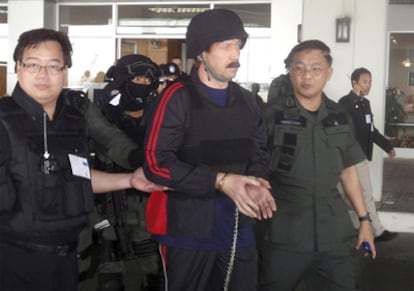A final bout of misfortune for elusive arms dealer
Convicted in a Manhattan court last week, Viktor Bout operated a lucrative trade between Marbella and Russia
In March 2004, Spanish authorities were hot on the trail of international arms dealer Viktor Bout. The notorious Russian-born weapons trafficker was to attend a birthday celebration for his daughter who lived in Spain.
But at the last minute, the March 11, 2004 Madrid train bombings and the extra security that followed afterward made him change his mind. Just a year before, Bout had narrowly escaped capture as he was flying from Moldova to Greece where British agents were waiting for him.
"Sometimes he's been lucky," Mark Galeotti, a historian who has advised the British government on Russian organized crime, told Mother Jones magazine in 2008. "Sometimes he's been wily and thought, 'Hang on, this doesn't quite pan out right.' Other times it may well be that he was tipped off."
After years of making multi-million-dollar illegal weapons sales to terrorists and other obscure groups in Africa, the Middle East, Asia and Latin America, the 44-year-old Bout was convicted by a jury Wednesday in a Manhattan federal courtroom for plotting to sell weapons to informants who passed themselves off as Colombian guerrillas. He faces 25 years to life when he is sentenced next year.
Bout, who lived in Moscow and was also careful about where he went abroad, was finally arrested in Thailand on March 5, 2008 as he was to meet the informants who were posing as "Colombian rebels." He was extradited to the United States in November 2010. Aside from the details of the undercover meetings and surveillance that led to Bout's indictment, much about his past dealings and how and where he made his money are based on journalistic reports.
It is believed he travelled to Spain frequently to visit his daughter and sometimes met with another convicted arms trafficker, the wealthy Syrian Monzer al-Kassar who, before his arrest at Madrid Barajas International Airport in 2007 and extradition the following year to the United States, lived openly and ostentatiously in Marbella. Al Kassar, "the prince of Marbella" as he was known, was also convicted of trying to supply weapons to the Revolutionary Armed Forces of Colombia (FARC). He is serving a 30-year sentence in the United States.
Bout began his career in the early 1990s by purchasing several aircraft to start his own private air cargo and charter passenger companies. For years it was reported that he had been secretly running weapons to insurgency groups, rebel leaders and rogue governments.
By 2004, major newspapers in Europe and the United States began reporting how Bout's front companies were helping legitimate governments, such as Washington, fly supplies into Iraq for the US military.
In June 2006, Europa Press, quoting Spanish military sources, reported that one of Bout's companies, Transavia Export Cargo, held a Defense Ministry contract to transport military equipment on Russian-made Ilyushin aircraft. The news service offered a detailed summary of Bout's arms-trafficking deals and sanctions imposed on him by the United Nations.
Prior to the report, the Defense Ministry had acknowledged that in 2002 it had signed a contract with the agency NAMSA to conduct an open bid in Europe for cargo transport planes to be used in UN peace missions. The winner of the bid, Chapman Freeborn, reportedly uses fleets through subcontracts with cargo firms in Russia, Ukraine, Portugal and Egypt as well as Transavia Export of Belarus.

Tu suscripción se está usando en otro dispositivo
¿Quieres añadir otro usuario a tu suscripción?
Si continúas leyendo en este dispositivo, no se podrá leer en el otro.
FlechaTu suscripción se está usando en otro dispositivo y solo puedes acceder a EL PAÍS desde un dispositivo a la vez.
Si quieres compartir tu cuenta, cambia tu suscripción a la modalidad Premium, así podrás añadir otro usuario. Cada uno accederá con su propia cuenta de email, lo que os permitirá personalizar vuestra experiencia en EL PAÍS.
¿Tienes una suscripción de empresa? Accede aquí para contratar más cuentas.
En el caso de no saber quién está usando tu cuenta, te recomendamos cambiar tu contraseña aquí.
Si decides continuar compartiendo tu cuenta, este mensaje se mostrará en tu dispositivo y en el de la otra persona que está usando tu cuenta de forma indefinida, afectando a tu experiencia de lectura. Puedes consultar aquí los términos y condiciones de la suscripción digital.








































